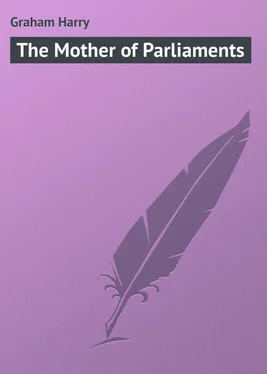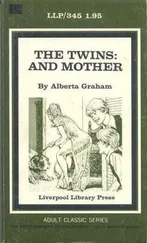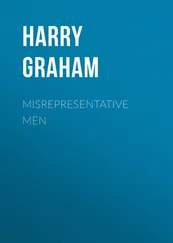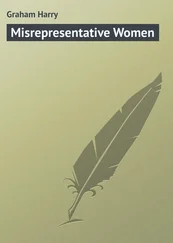Harry Graham - The Mother of Parliaments
Здесь есть возможность читать онлайн «Harry Graham - The Mother of Parliaments» — ознакомительный отрывок электронной книги совершенно бесплатно, а после прочтения отрывка купить полную версию. В некоторых случаях можно слушать аудио, скачать через торрент в формате fb2 и присутствует краткое содержание. Жанр: foreign_prose, на английском языке. Описание произведения, (предисловие) а так же отзывы посетителей доступны на портале библиотеки ЛибКат.
- Название:The Mother of Parliaments
- Автор:
- Жанр:
- Год:неизвестен
- ISBN:нет данных
- Рейтинг книги:5 / 5. Голосов: 1
-
Избранное:Добавить в избранное
- Отзывы:
-
Ваша оценка:
- 100
- 1
- 2
- 3
- 4
- 5
The Mother of Parliaments: краткое содержание, описание и аннотация
Предлагаем к чтению аннотацию, описание, краткое содержание или предисловие (зависит от того, что написал сам автор книги «The Mother of Parliaments»). Если вы не нашли необходимую информацию о книге — напишите в комментариях, мы постараемся отыскать её.
The Mother of Parliaments — читать онлайн ознакомительный отрывок
Ниже представлен текст книги, разбитый по страницам. Система сохранения места последней прочитанной страницы, позволяет с удобством читать онлайн бесплатно книгу «The Mother of Parliaments», без необходимости каждый раз заново искать на чём Вы остановились. Поставьте закладку, и сможете в любой момент перейти на страницу, на которой закончили чтение.
Интервал:
Закладка:
Two years after this scene, in 1772, Burke was kept waiting for three hours with a Bill which he was carrying from the Commons to the Lords. When he subsequently reported his ill-treatment to the Lower House, their indignation knew no bounds, and they proceeded to revenge themselves in a somewhat puerile manner. The very next Bill that the House of Lords sent down to them was rejected unanimously, and the Speaker threw the offensive measure on to the floor of the House, whence it was kicked to the door by a number of indignant members.
It is not difficult to understand the cause of jealousy and anger between the Houses, in spite of the fact that so many of the Lords have at one time or another been members of the Commons, and so many of the Commons hope to end their days in the Lords. (Croker, in a letter to Lord Hatherton, recalls a visit he paid as a stranger to the Upper House in 1857, where, of the thirty peers present, there was not one but had sat with him in the Commons, including the Duke of Wellington and the Lord Chancellor. "It shows," he says, "how completely the House of Commons has been the nursery of the House of Lords." 47 47 Croker's "Letters," vol. i. p. 85.
) The resentment against the Lords that undoubtedly exists in the bosoms of the Commons, which is not confined to one side of the House, but seems to be universal, results from the power of rejection which the peers can at any time exercise with regard to a measure, or of making amendments by which they can alter it out of all recognition, thus nullifying in a single day the labours of months in the Lower House. And when it is considered that this ruinous result is due not only to men who owe their seats to their successful exertions in various professions, but also in larger proportion to those who owe them to being, as Lord Thurlow said of the Duke of Grafton, "the accident of an accident," 48 48 One is reminded of the reply addressed by the Emperor Alexander to Madame de Stael who was complimenting Russia on possessing so able a ruler. "Alas, Madame," he said, "I am nothing but a happy accident!"
the situation must to many minds appear wholly intolerable.
One very clear cause of failure in the House of Lords to give satisfaction lies in the fact that, although government by Party is the very groundwork of the parliamentary constitution, as far as the Upper House is concerned such an idea might just as well not exist at all. Whatever the political complexion of the party in power in the House of Commons, the Lords maintain an invariable Conservative majority, indifferent to the swing of any popular pendulum, and as fixed and unalterable as the sun. But at no time for the last century has the inequality been so marked as at present, when it may be truthfully said that the Liberal peers would scarcely fill a dozen "hackney coaches." 49 49 At the time of the French Revolution, the country supported the Government so strongly that the Opposition dwindled away to nothing. It was even jestingly asserted that the Whigs could all have been held in one hackney coach. "This is a calumny," said George Byng; "we should have filled two!" Campbell's "Lives of the Chancellors," vol. v. p. 614.
And though the Liberal party has created a considerable number of peers during the last few years, it has never recovered from the secession of Liberal Unionists, and it would take many years of Liberal supremacy and large drafts upon the Prerogative of the Crown to restore even the comparative balance of early Victorian days.
This may or may not be an advantage, for though the staunch Tory is tempted to exclaim in the words of Disraeli: "Thank God there is a House of Lords!" the equally staunch Radical is scarcely likely to consider the existence of this perpetually antagonistic majority a sufficient cause for gratitude towards the Almighty. The difficulty of equalising the parties seems insurmountable, so long as ennoblement is an expensive luxury and Peers continue to be drawn from the wealthy classes. 50 50 It is suggested that the balance of party could be adjusted by the Government persuading the Crown to create a number of peerages sufficient to flood the House with peers of their particular political persuasion. In 1712, Queen Anne was prevailed upon to create twelve peers in a single day, in order to pass a Government measure. "If these twelve had not been enough," said Bolingbroke, "we could have given them another dozen!" William IV. was prepared to create a hundred new peers to ensure the passing of the Reform Bill of 1832. It remains to be seen whether such an idea is nowadays practicable.
There is, too, something essentially Conservative about the atmosphere of the House of Lords, which sooner or later impregnates the blood of its inmates; under its influence the Liberal of one generation rapidly exhibits a tendency to develop into the Conservative of the next. But this charge is no doubt one which may be brought with more or less truth against any Second Chamber, however constituted, which is composed of men of a certain age and position, not immediately responsible to the fluctuating voices of the people. Whether one considers such stability to be a merit or the reverse depends upon whether one adopts Lord Palmerston's and Lord Salisbury's views of the functions of a Senate, or regards it merely as a useful and select body of legislators enjoying certain limited powers of criticism and delay.
So much has been written about this great modern controversy, that it is unnecessary to increase the literature which exists upon both sides. The issue seems to lie between reducing the Second Chamber to comparative impotence or attempting by judicious reforms in its composition to bring it into greater sympathy with the First Chamber.
The Resolutions recently passed by the Commons, 51 51 "1. That it is expedient that the House of Lords be disabled by Law from rejecting or amending a Money Bill, but that any such limitation by Law shall not be taken to diminish or qualify the existing rights and privileges of the House of Commons. "For the purpose of this Resolution a Bill shall be considered a Money Bill if, in the opinion of the Speaker, it contains only provisions dealing with all or any of the following subjects, namely, the imposition, repeal, remission, alteration, or regulation of taxation; Charges on the Consolidated Funds or the provision of Money by Parliament; Supply; the appropriation, control, or regulation of public money; the raising or guarantee of any loan or the repayment thereof; or matters incidental to those subjects or any of them." "2. That it is expedient that the powers of the House of Lords, as respects Bills other than Money Bills, be restricted by Law, so that any such Bill which has passed the House of Commons in three successive Sessions, and, having been sent up to the House of Lords at least one month before the end of the Session, has been rejected by that House in each of those sessions, shall become Law without the consent of the House of Lords on the Royal Assent being declared; Provided that at least two years shall have elapsed between the date of the first introduction of the Bill in the House of Commons and the date on which it passes the House of Commons for the third time. "For the purposes of this Resolution a Bill shall be treated as rejected by the House of Lords if it has not been passed by the House of Lords either without Amendment or with such Amendments only as may be agreed upon by both Houses." "3. That it is expedient to limit the duration of Parliament to five years."
have for their object the complete annihilation of the latter in all matters of finance, and the retention for them of such modified powers of influencing other legislation as would enable them to delay Bills during the early years of a shortened Parliament, and refer them to the country during its last two years. The question of "tacking," in Money Bills, is to be referred to the sole arbitrament of the Speaker; but this becomes of trifling importance when it is argued that almost any revolutionary change could be effected within the corners of a legitimate financial measure. The objection taken to the overriding of the Veto in the case of a Bill thrice presented, is that it amounts to one-Chamber legislation and would result in two classes of Acts – one passed by the Commons alone, and the other by both Houses.
Интервал:
Закладка:
Похожие книги на «The Mother of Parliaments»
Представляем Вашему вниманию похожие книги на «The Mother of Parliaments» списком для выбора. Мы отобрали схожую по названию и смыслу литературу в надежде предоставить читателям больше вариантов отыскать новые, интересные, ещё непрочитанные произведения.
Обсуждение, отзывы о книге «The Mother of Parliaments» и просто собственные мнения читателей. Оставьте ваши комментарии, напишите, что Вы думаете о произведении, его смысле или главных героях. Укажите что конкретно понравилось, а что нет, и почему Вы так считаете.












